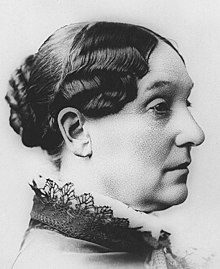Persistent Women
My initial attraction to Jane Kirkpatrick’s novel, Something Worth Doing, was the author’s name; my middle name is Kirkpatrick. Examining the book at my local library, I saw that it was about an early suffragist in Oregon, home state of a good friend. Celebrating the 100th anniversary of the 19th Amendment was still on my mind, too. This novel is truly Worth Reading
Based on the real Abigail Scott Duniway (October 22, 1834- October 11,1915), the novel makes this persistent woman come alive. Duniway, known as Jenny, worked more than forty years for women to attain true equality and full citizenship, while fulfilling the roles of wife, mother of six, sister, friend, teacher, writer, and business owner and resolving the many conflicts those multiple roles entailed.
Jenny, along with her parents, three brothers and five sisters, had left Groveland, Illinois in April 1852, when she was just seventeen, to travel with a wagon train to Oregon. Her mother died on the way. Upon arriving in the Willamette Valley, her father set up a small inn, employing his older children. With less than one year of formal schooling back in Illinois, Jenny, who read everything she could get her hands on, managed to pass the teacher’s test. By April 1853, Jenny began teaching at a school six miles south of Salem, full of confidence: “Like any good western woman, I can corral them without a rope.”
The Territory”s ratio of men to women was 100 to one. If an Oregon man married within a year of reaching the Territory, his new wife could bring 160 acres into the marriage in her own name (but as soon as she married, the control of it became her husband’s.) Jenny rejected her first suitor whom she could see was after her land value, and chose another who already had his 320 acres. Ben Duniway, a decent man who loved working with horses, gave her time to make up her own mind. Nevertheless, the courtship was quick. Jenny and Ben married on August 2, 1853 in the town of Lafayette. She had hand sewn her own wedding dress.
Jenny once asked her students to define “powerful,” giving her own definition first. “I think it’s a word that means one can set a goal and then figure out how to make it happen.” “No,” said one student, “it was wealth.” Another said, “No, when you’re big and strong like Mr. Duniway, that’s powerful.” But the smallest child, the quiet one, took her breath away. “I think powerful is when you want to quit, but you keep going.”
Duniway was a powerful force in Oregon and beyond because of she persistently kept going. She and her fellow suffragists suffered five losses in the state legislature —in 1884, 1900, 1906, 1908, and 1910—before Oregon women finally gained the ballot in 1912. Though criticized for traveling without her husband (gasp!) and having the audacity to speak in public, she enjoyed her husband’s unfailing support, just as I have always had that of my husband. Duniway persisted to see women across the United States get to vote in 1920.
One aspect of the book that struck me was the absence of Blacks. The mention in one sentence of exclusion laws led me to discover that indeed, Blacks were not welcome in Oregon. When I visited Portland in 2009, I remember how few I saw. The Oregon Historical Society reports:
Oregon’s racial makeup has been shaped by three Black exclusion laws that were in place during much of the region’s early history. These laws, all later rescinded, largely succeeded in their aim of discouraging free Blacks from settling in Oregon early on, ensuring that Oregon would develop as primarily white. White emigrants who came to present-day Oregon during the 1840s and 1850s generally opposed slavery, but many also opposed living alongside African Americans. Many were nonslaveholding farmers from Missouri and other border states who had struggled to compete against those who owned slaves.
Oregon became a state in 1859. The last of these exclusion laws was rendered moot by the 14th Amendment to the U.S. Constitution, ratified in 1868, but the laws had their effect. The Historical Society states that the 1860 census for Oregon “reported 128 African Americans in a total population of 52,465. In 2013, only 2 percent of the Oregon population was Black.”
Duniway’s written legacy includes her weekly human-rights newspaper, The New Northwest, which she edited and published in Portland for sixteen years (1871-1887); The Coming Century, her “Journal of Progress and Reform” (1891-1892); and The Pacific Empire, a Portland weekly she edited for three years (1895-1897). She also wrote an epic poem, David and Anna Matson (1876), an autobiography, Path Breaking (1914); and twenty-two novels.
This book would be ideal to discuss. I can imagine readers contemplating their own stresses, sharing their long-range goals, and identifying ways to maintain equilibrium in their lives. Jenny Duniway reminded me of the heroine of Wilma Dykeman’s novel, The Tall Woman. Like Lydia McQueen, Jenny Duniway transcends time and geography; both are worthy models. No wonder the Oregon Historical Society is celebrating Women Suffragists from now through August 2021 in an exhibit titled “Nevertheless, They Persisted.”
Born 100 years after Duniway, Gloria Steinem is another persistent crusader for equal treatment for women. In contrast to Duniway, Steinem stayed single most of her life and had no children. She, too, was a journalist. As founder of MS magazine, she brought about positive change for women across the United States and around the world. Last night Steve and I watched The Glorias, a 2020 movie that employed four actresses to portray all she has done in her long life. Gloria herself, now 86, appears at the end.


Leave a Reply